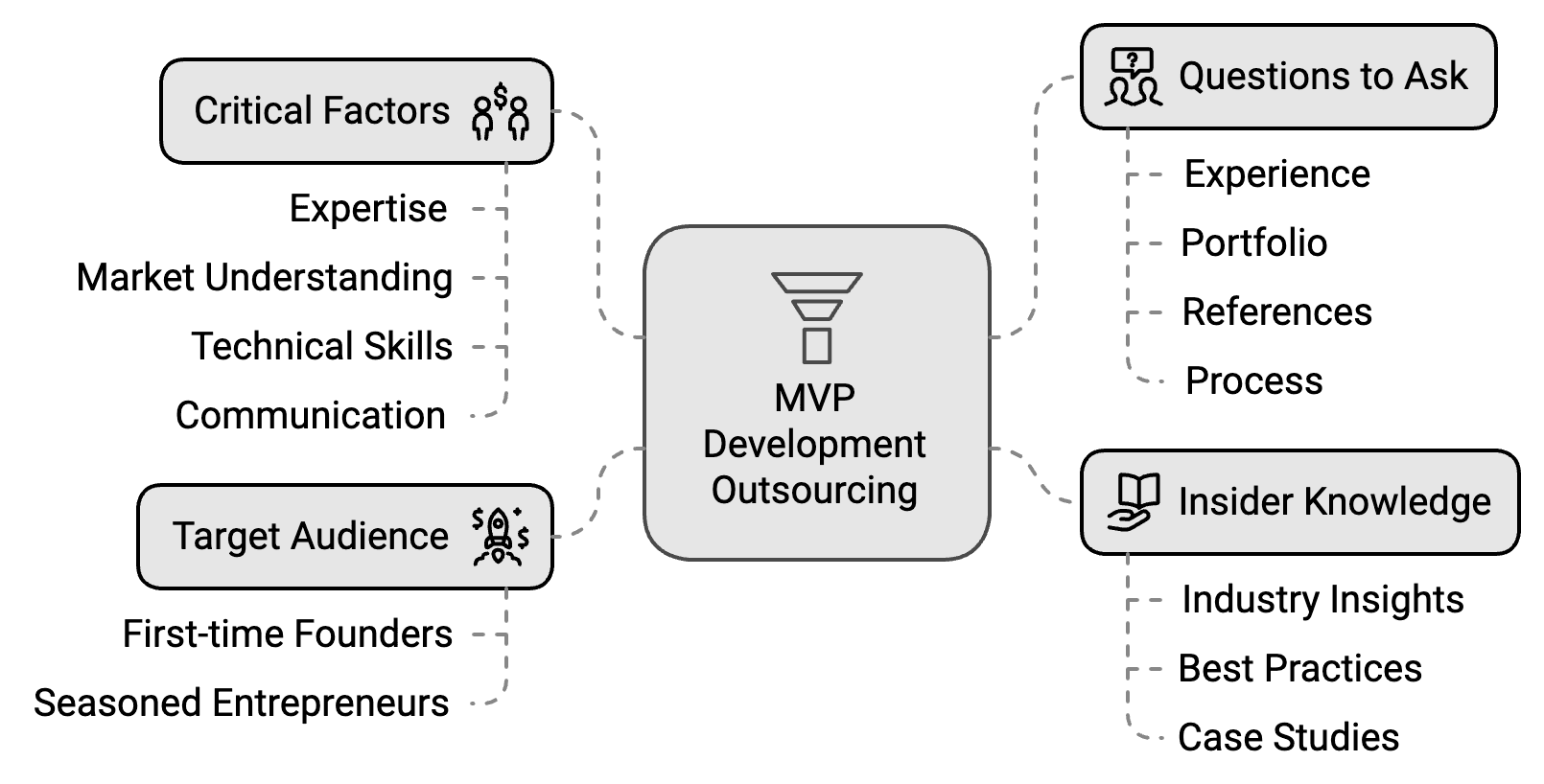
mvp
Imagine you're at the helm of a promising startup.The next step? Bringing that idea to life through a well-crafted MVP. But here's the catch: with countless agencies vying for your attention, how do you separate the wheat from the chaff? How do you find a partner who not only understands your vision but has the expertise to transform it into a market-ready product?
This comprehensive guide is your compass in the complex landscape of MVP development outsourcing. We'll walk you through seven critical factors that can make or break your startup's journey.

Each section is packed with insider knowledge and pointed questions to ask potential partners. Whether you're a first-time founder or a seasoned entrepreneur, this guide will equip you with the insights needed to make an informed decision. By the end of this article, you'll have a clear roadmap for selecting an MVP development agency that aligns with your vision, understands your market, and can turn your idea into a product that users love.
When selecting an MVP development agency, their experience in your industry can significantly impact your project's success. Look for an agency that understands your sector's unique challenges and opportunities.
Review their portfolio for projects similar to yours. This will give you insights into their familiarity with industry-specific requirements and trends.
Key points to consider:
Questions to ask:
The agency's technical prowess should align with your MVP's requirements. Ensure they have expertise in the technologies crucial for your project.
Discuss their preferred tech stack and why they believe it's suitable for your MVP. Their choices should be based on your project's specific needs, not just current trends.
Important factors to evaluate:
Questions to ask:
Effective communication and project management are crucial for successful MVP development. The agency should have clear processes in place to keep you informed and involved throughout the project.
Ask about their project management methodology and how they handle client communication. Look for transparency and a collaborative approach.
Key aspects to look for:
Questions to ask:
An effective MVP should be built with future growth in mind. Ensure the agency has a track record of creating scalable solutions that can evolve with your business needs.
Discuss their approach to architecture and how they plan for potential pivots or expansions. A good agency should balance immediate MVP needs with long-term scalability.
Key scalability factors:
Questions to ask:
Quality assurance is crucial for delivering a reliable MVP. The agency should have robust testing procedures to ensure your product works as intended.
Inquire about their testing methodologies and how they maintain quality throughout the development process. Look for a balance between automated testing and manual quality checks.
Important QA aspects:
Questions to ask:
Your relationship with the agency shouldn't end at launch. Understand their approach to post-launch support and ongoing maintenance.
Discuss their support packages and how they handle updates, bug fixes, and feature additions after the MVP is live. Ensure they have a plan for knowledge transfer to your team.
Key support considerations:
Questions to ask:
Understanding the cost structure is crucial for avoiding surprises and ensuring your MVP development stays within budget.
Ask for a detailed breakdown of their pricing model and what's included at each stage of development. Look for transparency in how they handle additional costs or scope changes.
Important budget factors:
Questions to ask:
A successful MVP isn't just about functionality; it needs to provide a great user experience. Assess the agency's design skills and their approach to user-centric development.
Look for evidence of their UX/UI expertise in their portfolio. The agency should demonstrate a clear process for incorporating user feedback and iterating on designs.
Key design considerations:
Questions to ask:
The success of your MVP project often depends on how well you can work with the agency team. Evaluate the agency's culture and work style to ensure compatibility with your startup.
Look for an agency that shares your values and can adapt to your working style. Consider factors like communication preferences, work hours, and problem-solving approaches.
Important compatibility factors:
Questions to ask:
In today's competitive market, the key to developing successful products is understanding customer needs and providing remarkable user experiences.
Our approach revolves around the concept of product thinking, which emphasizes customer-centric solutions and sets us apart from other development firms. This philosophy is at the core of our approach, enabling us to consistently deliver exceptional results.
By choosing us as your development partner, you can be confident that your MVP will stand the test of time and adapt to the ever-changing market.
👉🏼If you’re looking for a partner — not just an agency — to build your MVP, talk to us. Read our core principles that guide us from discovery to development, you’ll know why we’re different
Read more:
leveraging tech for
business growth
Cyces.